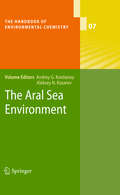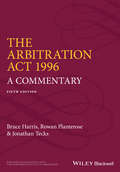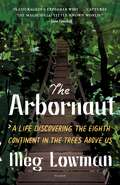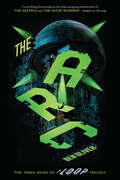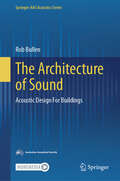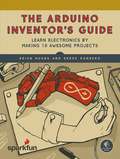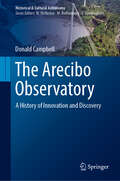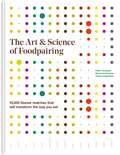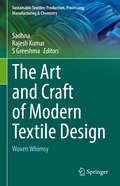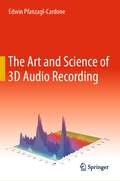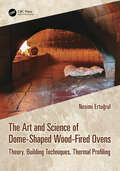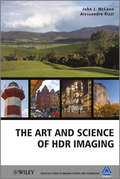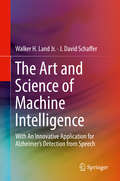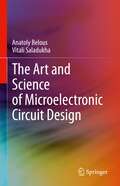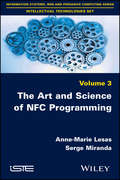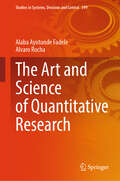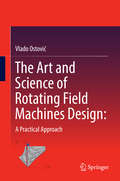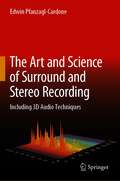- Table View
- List View
The Aral Sea Environment
by Aleksey N. Kosarev Andrey G. KostianoyThe environmental problems in the Aral Sea region continue to worsen. This volume presents the information gathered to date on various aspects of the Aral Sea environment. Specialists from institutions in Russia, Uzbekistan, France, Germany and the USA cover different topics - from the paleohistory and archaeology of the region, to the present physical, chemical and biological state of the sea, and the analysis of the runoff and deltas of the Amudarya and Syrdarya rivers. Further, the regional climate change is discussed and reasons for the progressing environmental crisis and the socio-economic problems in the region are highlighted. The Aral Sea Environment is addressed to scientists working in the fields of physical oceanography, marine chemistry, biology, and the environmental sciences.
The Arbitration Act 1996
by Bruce Harris Jonathan Tecks Rowan PlanteroseThe most readable, useful, practical and user-friendly guide to the Arbitration Act 1996.The Arbitration Act 1996 is a section by section commentary on the Act, which Lord Bingham described as "intensely practical and admirably user-friendly" when it was first published. The fifth edition has been updated by considering in excess of 300 new cases decided since publication of the 4th edition. In addition there have been some significant changes to the Model Law since publication of the previous edition, (which take it into areas where UK arbitration does not go), and these changes are documented, updated and commented upon. In previous editions, the authors have limited themselves to mentioning states conclusively declared to be parties to the New York Convention by Order in Council. This tends to follow some way behind the current position, however, so a more comprehensive coverage of states which are parties to the New York Convention is included. The result is a thorough update, providing the most readable and useful guide to the Act. provides a section by section commentary on the Act and covers all the key casespublished in conjunction with the Chartered Institute of Arbitrators and used by them as a recommended training textthe bestseller of the four original guides to the 1996 Actwritten by three practising arbitrators, two of whom are also practising barristers'There should not be a practitioner who does not have a copy...highly recommended.' - Arbitration
The Arbornaut: A Life Discovering the Eighth Continent in the Trees Above Us
by Meg Lowman“An eye-opening and enchanting book by one of our major scientist-explorers.” —Diane Ackerman, author of The Zookeeper’s WifeNicknamed the “Real-Life Lorax” by National Geographic, the biologist, botanist, and conservationist Meg Lowman—aka “CanopyMeg”—takes us on an adventure into the “eighth continent” of the world's treetops, along her journey as a tree scientist, and into climate actionWelcome to the eighth continent!As a graduate student exploring the rain forests of Australia, Meg Lowman realized that she couldn’t monitor her beloved leaves using any of the usual methods. So she put together a climbing kit: she sewed a harness from an old seat belt, gathered hundreds of feet of rope, and found a tool belt for her pencils and rulers. Up she went, into the trees. Forty years later, Lowman remains one of the world’s foremost arbornauts, known as the “real-life Lorax.” She planned one of the first treetop walkways and helps create more of these bridges through the eighth continent all over the world. With a voice as infectious in its enthusiasm as it is practical in its optimism, The Arbornaut chronicles Lowman’s irresistible story. From climbing solo hundreds of feet into the air in Australia’s rainforests to measuring tree growth in the northeastern United States, from searching the redwoods of the Pacific coast for new life to studying leaf eaters in Scotland’s Highlands, from conducting a BioBlitz in Malaysia to conservation planning in India and collaborating with priests to save Ethiopia’s last forests, Lowman launches us into the life and work of a field scientist, ecologist, and conservationist. She offers hope, specific plans, and recommendations for action; despite devastation across the world, through trees, we can still make an immediate and lasting impact against climate change. A blend of memoir and fieldwork account, The Arbornaut gives us the chance to live among scientists and travel the world—even in a hot-air balloon! It is the engrossing, uplifting story of a nerdy tree climber—the only girl at the science fair—who becomes a giant inspiration, a groundbreaking, ground-defying field biologist, and a hero for trees everywhere.Includes black-and-white illustrations
The Arc (The Loop)
by Ben OliverIn the final installment of critically acclaimed Loop trilogy, all of humanity hinges on the greatest escape yet.All hope has seemingly been executed.Despite the fact that the truth of their oppressive leaders had been revealed to them, the crowd of Alts cheer as life drained from the boy. But one Alt, Chester “Chilly” Beckett, did not celebrate; his eyes have been opened to the truth. The corpse is dragged away, but Chester remains determined to find out what is going on in the Laboratory on the 65th floor.There, he'll find three subjects tortured in an attempt to extract a regeneration formula… and one of the subjects is, impossibly, a face he never thought he'd seen again. A bold escape sets in motion a race against time as Happy’s plans to release planet-eating nano-bots into the world draw nearer. The Loop team must reassemble, survive Happy’s final attempts to rid the world of the rebels, and figure out how to halt the apocalypse before humanity is destroyed.
The Archaeology of Home: An Epic Set on a Thousand Square Feet of the Lower East Side
by Katharine GreiderWhen Katharine Greider was told to leave her house or risk it falling down on top of her and her family, it spurred an investigation that began with contractors' diagnoses and lawsuits, then veered into archaeology and urban history, before settling into the saltwater grasses of the marsh that fatefully once sat beneath the site of Number 239 East 7th Street. During the journey, Greider examines how people balance the need for permanence with the urge to migrate, and how the home is the resting place for ancestral ghosts. The land on which Number 239 was built has a history as long as America's own. It provisioned the earliest European settlers who needed fodder for their cattle; it became a spoil of war handed from the king's servant to the revolutionary victor; it was at the heart of nineteenth-century Kleinedeutschland and of the revolutionary Jewish Lower East Side. America's immigrant waves have all passed through 7th Street. In one small house is written the history of a young country and the much longer story of humankind and the places they came to call home.
The Archers Year Of Food and Farming: A celebration of Ambridge's most delicious produce, from the fields to the kitchens, with a side order of gossip
by Keri Davies'What's for tea, Clarrielove?' From the fabled kitchens of Ambridge come the recipes and gossip that fuel the nation's favourite village.Whether it's Susan's spicy chilli con carne on the hob or Helen's dramatic tuna bake in the oven, Jill's flapjacks stacked high or Alastair's Goan fish curry hotting up suppertime, this celebration of Ambridge life will take fans even closer to the heart of every Archers home.But this book isn't just a cook-along with our favourite families. It's full to the brim with tales and memories. The Archers Year of Food and Farming shares the ups and downs of the inhabitants of Ambridge and celebrates our countryside in all of its green and pleasant glory.Month-by-month, we learn more about the farming community and those big events in the Ambridge calendar: Shrove Tuesday and Easter, lambing, Open Farm Sunday, the village fete, Apple Day, the harvest, Stir-up Sunday and Deck the Hall.Rural traditions are alive and well in The Archers, but it's a contemporary world that is full of warmth, wit and the unexpected.
The Archers Year Of Food and Farming: A celebration of Ambridges most delicious produce, from the fields to the kitchens, with a side order of gossip
by Keri Davies'What's for tea, Clarrielove?' From the fabled kitchens of Ambridge come the recipes and gossip that fuel the nation's favourite village.Whether it's Susan's spicy chilli con carne on the hob or Helen's dramatic tuna bake in the oven, Jill's flapjacks stacked high or Alastair's Goan fish curry hotting up suppertime, this celebration of Ambridge life will take fans even closer to the heart of every Archers home.But this book isn't just a cook-along with our favourite families. It's full to the brim with tales and memories. The Archers Year of Food and Farming shares the ups and downs of the inhabitants of Ambridge and celebrates our countryside in all of its green and pleasant glory.Month-by-month, we learn more about the farming community and those big events in the Ambridge calendar: Shrove Tuesday and Easter, lambing, Open Farm Sunday, the village fete, Apple Day, the harvest, Stir-up Sunday and Deck the Hall.Rural traditions are alive and well in The Archers, but it's a contemporary world that is full of warmth, wit and the unexpected.
The Archimedes Codex: How a Medieval Prayer Book Is Revealing the True Genius of Antiquity's Greatest Scientist
by Reviel NetzPart archaeological detective story, part science, and part history, The Archimedes Codex tells the astonishing story of a lost manuscript, from its tenth-century creation in ancient Constantinople to the auction block at Christie’s in New York, and how a team of scholars used the latest imaging technology to reveal and decipher the original text. What they found was the earliest surviving manuscript by Archimedes (287 BC#150;212 BC), the greatest mathematician of antiquity#151;a manuscript that established, for the first time, the extent of his mathematical genius, which was two thousand years ahead of modern science.
The Architectural and Technological Revolution of 5G
by José Luiz Frauendorf Érika Almeida de SouzaThe book discusses the evolution of cellular technology, then focusing in on 5G and its architecture and what it means for current engineers. The book first focuses on 4G and how it changed the industry, allowing people to communicate by connecting devices to the internet. The authors detail the emergence of services and applications that have revolutionized communication and continue to impact the daily habits of majority of the world's population. The authors endeavor to tell this story by showing the path taken until the arrival of 5G, detailing how technological and architectural progress evolved in all these years. It is a technical book, but the authors take care to explain in detail each aspect related to technology in order to allow everyone interested in the subject to delve into this important topic.Presents a comprehensive explanation about 4G and 5G architecture, modulation and protocols;Includes a thorough explanation of modern antennas technology and O-RAN;Relevant to technology professionals and students interested in 5G, but with little background in telecommunications;The English translation of this book from its Portuguese original manuscript was done with the help of artificial intelligence (machine translation by the service provider DeepL.com). A subsequent human revision of the content was done by the author.
The Architecture of Natural Cooling
by Brian Ford Rosa Schiano-Phan Juan A. VallejoOverheating in buildings is commonplace. This book describes how we can keep cool without conventional air-conditioning: improving comfort and productivity while reducing energy costs and carbon emissions. It provides architects, engineers and policy makers with a ‘how-to’ guide to the application of natural cooling in new and existing buildings. It demonstrates, through reference to numerous examples, that natural cooling is viable in most climates around the world. This completely revised and expanded second edition includes: An overview of natural cooling past and present. Guidance on the principles and strategies that can be adopted. A review of the applicability of different strategies. Explanation of simplified tools for performance assessment. A review of components and controls. A detailed evaluation of case studies from the USA, Europe, India and China. This book is not just for the technical specialist, as it also provides a general grounding in how to avoid or minimise air-conditioning. Importantly, it demonstrates that understanding our environment, rather than fighting it, will help us to live sustainably in our rapidly warming world.
The Architecture of Sound: Acoustic Design For Buildings (Springer-AAS Acoustics Series)
by Rob BullenThis book highlights the range of issues involved in designing interior spaces for acoustics—that is, ensuring that the sound of a space matches its function. The book presents the principles of acoustic design, together with practical advice on how to apply those principles. The fundamental elements of background sound, intruding sound, sound quality, and speech intelligibility are each described, with design goals, calculation procedures, and advice on implementation. Contemporary challenges associated with integrating acoustics and sustainable building design are also covered. Finally, two types of space—school classrooms and hospital wards—are considered in detail, as examples.
The Arduino Inventor's Guide: Learn Electronics by Making 10 Awesome Projects
by Derek Runberg Brian HuangWith Arduino, you can build any hardware project you can imagine. This open-source platform is designed to help total beginners explore electronics, and with its easy-to-learn programming language, you can collect data about the world around you to make something truly interactive.The Arduino Inventor's Guide opens with an electronics primer filled with essential background knowledge for your DIY journey. From there, you’ll learn your way around the Arduino through a classic hardware entry point—blinking LEDs. Over the course of the book, 11 hands-on projects will teach you how to:–Build a stop light with LEDs–Display the volume in a room on a warning dial–Design and build a desktop fan–Create a robot that draws with a motor and pens–Create a servo-controlled balance beam–Build your own playable mini piano–Make a drag race timer to race toy cars against your friendsEach project focuses on a new set of skills, including breadboarding circuits; reading digital and analog inputs; reading magnetic, temperature, and other sensors; controlling servos and motors; and talking to your computer and the Web with an Arduino. At the end of every project, you’ll also find tips on how to use it and how to mod it with additional hardware or code.What are you waiting for? Start making, and learn the skills you need to own your technology!Uses the Arduino Uno board or SparkFun RedBoard
The Arecibo Observatory: A History of Innovation and Discovery (Historical & Cultural Astronomy)
by Donald CampbellWritten by its former Director, this book presents a historical account of the famous Arecibo Observatory and its 305-meter radio astronomical telescope, widely known for its groundbreaking scientific discoveries and starring role in the James Bond movie, Golden Eye.The story details the planning, funding and construction of the telescope; the people who masterminded and contributed to the project; and the involvement of the US Department of Defense in funding the construction. It also includes the seminal scientific achievements in the three research areas to which the telescope contributed, ionospheric physics, planetary science and radio astronomy.The book continues through later upgrades made to the site, showing how the Arecibo telescope has arguably remained the world’s most versatile and productive radio science instrument for over 50 years. This historical account will fascinate astronomers and historians of science, serving as a valuable contribution to the history of 20th century astronomy.
The Armchair General: Can You Defeat the Nazis? (The Armchair General #1)
by John BuckleyA ground-breaking approach to history where YOU choose the fate of WWII - perfect for readers of Bletchley Park Brainteasers and The GCHQ Puzzle Book.''An original and exciting approach . . . Buckley is one of our very finest historians.' JAMES HOLLAND________________________TAKE THE HOTSEATAssume the role of real Generals, Leaders, Soldiers and Intelligence Officers in the Allied Forces during WWII, including Winston Churchill and President Eisenhower.EXAMINE THE INTELLIGENCEExplore eight key moments of the war with real contemporaneous intelligence: Britain's Darkest Hour, 1940; The War in North Africa; Stalin's War on the Eastern Front; The Pacific Battle of Midway; The Dresden Bomber Offensive; Casablanca; Arnhem and Operation Market Garden; The Bomb and Hiroshima.CONSIDER THE SCENARIO & MAKE YOUR DECISIONFrom battlefields to war cabinets, each tactical and strategic decision you make leads to a different outcome.Will you follow the path of the past - or shape a new history?________________________'Wonderfully original . . . putting readers at the heart of the decision-making process and allowing them, literally, to change the course of history. This is counterfactual history at its best.' SAUL DAVID'A reminder that history is a never ending now, a relentless and endless present that comes without the luxury of hindsight.' AL MURRAY'An original and exciting approach . . . Buckley is one of our very finest historians. The Armchair General adds enormously to our understanding of the conflicts.' JAMES HOLLAND'A unique, enjoyable approach to evaluating military decision-making.' HISTORY OF WAR
The Art & Science of Foodpairing: 10,000 Flavour Matches That Will Transform The Way You Eat
by Peter Coucquyt Bernard Lahousse Johan Langenbick"We build tools to create culinary happiness" - Foodpairing.com "There is a world of exciting flavour combinations out there and when they work it's incredibly exciting" - Heston BlumenthalFoodpairing is a method for identifying which foods go well together, based on groundbreaking scientific research that combines neurogastronomy (how the brain perceives flavour) with the analysis of aroma profiles derived from the chemical components of food.This groundbreaking new book explains why the food combinations we know and love work so well together (strawberries + chocolate, for example) and opens up a whole new world of delicious pairings (strawberries + parmesan, say) that will transform the way we eat. With ten times more pairings than any other book on flavour, plus the science behind flavours explained, Foodpairing will become THE go-to reference for flavour and an instant classic for anyone interested in how to eat well.Contributors:Astrid Gutsche and Gaston Acurio - Astrid y Gaston - PeruAndoni Luiz Aduriz - Mugaritz - SpainHeston Blumenthal - The Fat Duck - UKTony Conigliaro - DrinksFactory - UKSang Hoon Degeimbre - L'Air du Temps - BelgiumJason Howard - #50YearsBim - UK/CaribbeanMingoo Kang - Mingles - KoreaJane Lopes & Ben Shewry - Attica - AustraliaVirgilio Martinez - Central - PeruDominique Persoone - The Chocolate Line - BelgiumKarlos Ponte - Taller - Venezuela/DenmarkJoan Roce - El Celler de Can Roca - SpainDan Barber - Blue Hill at Stone Barns - USAKobus van der Merwe - Wolfgat - South AfricaDarren Purchese - Burch & Purchese Sweet Studio - MelbourneAlex Atala - D.O.M - BrazilMaría José San Román - Monastrell - SpainKeiko Nagae - Arôme conseil en patisserie - Paris
The Art and Craft of Modern Textile Design: Woven Whimsy (Sustainable Textiles: Production, Processing, Manufacturing & Chemistry)
by Rajesh Kumar Sadhna S. GreeshmaThis contributed volume explores the craft and science of modern textile design. It offers a carefully curated collection of essays, insights, and case studies. The chapters presented here exist where craftsmanship converges with cutting-edge technology and traditional techniques, dance with avant-garde experimentation, and illustrate how fabric can unlock limitless possibilities of artistic expression. From the historical roots that anchor contemporary practices to the forefront of technological advancements shaping the industry, this book offers a panoramic view of the field. The chapters celebrate the artistry behind the loom and the visionary designers who push the boundaries of conventional thinking, transforming threads into transcendent works of art. As the title suggests, this volume is not just about technique; it explores the imaginative spirit that breathes life into fibers. The book invites readers to witness the synergy between tradition and innovation, uncover the narrative threads woven into every fabric, and appreciate the extraordinary craftsmanship that elevates textiles beyond mere utility. This edited volume is designed to appeal to a diverse audience – from students and scholars to industry professionals and anyone with an appreciation for the intersection of art and function. The book aims to provide readers with a thorough understanding of the various facets of contemporary textile design, from historical influences to emerging trends.
The Art and Science of 3D Audio Recording
by Edwin Pfanzagl-CardoneThis professional book offers a unique, comprehensive and timely guide on 3D audio recording. Intended for sound engineers and professionals, and summarizing more than twenty-year research on this topic, it includes extensive information and details on various microphone techniques and loudspeaker layouts, such as Auro-3D®, Dolby® AtmosTM, DTS:X®, MMAD, SONY 360 Reality Audio and Ambisonics. It presents a rich set of results obtained from both objective measurements and subjective listening tests, and a number of case studies for 3D recording, ranging from solo-instrument techniques to full symphony orchestra, and microphone systems for virtual reality applications. Further, it includes a chapter on spatial hearing discussing issues of 3D audio sound reproduction. All in all, this book offers extensive, practical information for sound engineers and professionals.
The Art and Science of Dome-Shaped Wood-Fired Ovens: Theory, Building Techniques, Thermal Profiling
by Nesimi ErtuğrulThe Art and Science of Dome-Shaped Wood-Fired Ovens, from history to your backyard or commercial shop, is a carefully crafted guide that explains the tradition and science of wood-fired cooking. The book embarks on a historical journey, tracing the development of wood-fired ovens and their cultural significance. It then unravels the theory of heating and the burning behaviour of wood, making complex technical concepts accessible.Transitioning from theory to practice, the guide outlines the design and construction process of a wood-fired oven. It considers engineering aspects and locally available materials, emphasizing efficient, sustainable building. The book discusses essential cooking utensils and tools, shedding light on the entire cooking process, from fire-starting to ash disposal.In a unique chapter on data logging, readers are introduced to modern temperature monitoring techniques. It shows how managing thermal mass can expand the range of recipes beyond the commonly perceived breads and pizzas. Lastly, the book explores Turkish cuisine, debunking preconceptions and presenting a wide array of dishes suitable for wood-fired ovens. The recipes span from traditional Turkish to International cuisines and fusion recipes, equipping readers with the tools to broaden their culinary repertoire.This book serves as an indispensable resource for anyone interested in wood-fired cooking, blending historical context, technical insights, practical advice, and mouth-watering recipes into a compelling narrative. This comprehensive manual aims to bring wood-fired cooking into the heart of modern culinary practice.
The Art and Science of HDR Imaging
by Alessandro Rizzi John J. MccannRendering High Dynamic Range (HDR) scenes on media with limited dynamic range began in the Renaissance whereby painters, then photographers, learned to use low-range spatial techniques to synthesize appearances, rather than to reproduce accurately the light from scenes. The Art and Science of HDR Imaging presents a unique scientific HDR approach derived from artists' understanding of painting, emphasizing spatial information in electronic imaging.Human visual appearance and reproduction rendition of the HDR world requires spatial-image processing to overcome the veiling glare limits of optical imaging, in eyes and in cameras. Illustrated in full colour throughout, including examples of fine-art paintings, HDR photography, and multiple exposure scenes; this book uses techniques to study the HDR properties of entire scenes, and measures the range of light of scenes and the range that cameras capture. It describes how electronic image processing has been used to render HDR scenes since 1967, and examines the great variety of HDR algorithms used today. Showing how spatial processes can mimic vision, and render scenes as artists do, the book also:Gives the history of HDR from artists' spatial techniques to scientific image processingMeasures and describes the limits of HDR scenes, HDR camera images, and the range of HDR appearancesOffers a unique review of the entire family of Retinex image processing algorithmsDescribes the considerable overlap of HDR and Color Constancy: two sides of the same coinExplains the advantages of algorithms that replicate human vision in the processing of HDR scenesProvides extensive data to test algorithms and models of vision on an accompanying websitewww.wiley.com/go/mccannhdr
The Art and Science of Machine Intelligence: With An Innovative Application for Alzheimer’s Detection from Speech
by J. David Schaffer Walker H. Land Jr.This volume presents several machine intelligence technologies, developed over recent decades, and illustrates how they can be combined in application. One application, the detection of dementia from patterns in speech, is used throughout to illustrate these combinations. This application is a classic stationary pattern detection task, so readers may easily see how these combinations can be applied to other similar tasks. The expositions of the methods are supported by the basic theory they rest upon, and their application is clearly illustrated. The book’s goal is to allow readers to select one or more of these methods to quickly apply to their own tasks.Includes a variety of machine intelligent technologies and illustrates how they can work togetherShows evolutionary feature subset selection combined with support vector machines and multiple classifiers combinedIncludes a running case study on intelligent processing relating to Alzheimer’s / dementia detection, in addition to several applications of the machine hybrid algorithms
The Art and Science of Microelectronic Circuit Design
by Anatoly Belous Vitali SaladukhaThis book guides readers through the entire complex of interrelated theoretical and practical aspects of the end-to-end design and organization of production of silicon submicron integrated circuits. The discussion includes the theoretical foundations of the operation of field-effect- and bipolar transistors, the methods and peculiarities of the structural and schematic design, basic circuit-design and system-design engineering solutions for bipolar, CMOS, BiCMOS and TTL integrated circuits, standard design libraries, and typical design flows.
The Art and Science of NFC Programming
by Anne-Marie Lesas Serge MirandaNFC is a world standard since 2004 which is now within every smartphone on the market. Such a standard enables us to do mobile transactions (mobile payment) in a secure way along with many other information- based tap’n play operations. This book has a double role for computer scientists (from bachelor students in CS to IT professionals).
The Art and Science of Quantitative Research (Studies in Systems, Decision and Control #599)
by Alvaro Rocha Alaba Ayotunde FadeleThis book reflects on the insights gained from exploring the key dimensions of quantitative research as outlined in the preceding chapters. Quantitative research, with its emphasis on objectivity, systematic methodologies, and statistical rigor, plays a pivotal role in advancing knowledge across diverse fields. The study began with an introduction to its foundational principles, highlighting its distinct characteristics and relevance. Key conclusions drawn from each chapter are summarized below:In the first chapter, a basic knowledge of quantitative research was presented, with an emphasis on the methodical and organized approach that quantitative research takes to the study of observable events. Quantitative research differs from qualitative research in that it focuses on numerical data, statistical analysis, and objective findings, as opposed to qualitative research, which investigates subjective experiences and meanings. This contrast highlights the crucial role that quantitative approaches play in hypothesis testing and predictive analysis, which makes them very beneficial for academic subjects that need empirical data and findings that can be replicated from experiment to experiment. In the next chapter, we delved further into the fundamental aspects of quantitative research, including its dependence on organized instruments (such as surveys and experiments), the significance of operationalizing variables, and the pursuit of results that can be generalized. When it comes to answering problems that need accuracy, scalability, and statistical validity, quantitative research is an indispensable tool because of these inherent characteristics. At the same time, the chapter brought attention to the attitude of the researcher, which includes taking an objective perspective, reducing prejudice, and adhering to ethical norms. This frame of mind is very necessary in order to guarantee the honesty and dependability of the findings of the investigation.
The Art and Science of Rotating Field Machines Design: A Practical Approach
by Vlado OstovićThis book highlights procedures utilized by the design departments of leading global manufacturers, offering readers essential insights into the electromagnetic and thermal design of rotating field (induction and synchronous) electric machines. Further, it details the physics of the key phenomena involved in the machines' operation, conducts a thorough analysis and synthesis of polyphase windings, and presents the tools and methods used in the evaluation of winding performance. The book develops and solves the machines' magnetic circuits, and determines their electromagnetic forces and torques. Special attention is paid to thermal problems in electrical machines, along with fluid flow computations. With a clear emphasis on the practical aspects of electric machine design and synthesis, the author applies his nearly 40 years of professional experience with electric machine manufacturers - both as an employee and consultant - to provide readers with the tools they need to determine fluid flow parameters and compute temperature distributions.
The Art and Science of Surround and Stereo Recording: Including 3D Audio Techniques
by Edwin Pfanzagl-CardoneThis book presents an extensive and timely survey of more than 30 surround and 20 stereo-microphone techniques. Further, it offers, for the first time, an explanation of why the RCA "Living Stereo" series of legacy recordings from the 1950s and 60s is still appreciated by music lovers worldwide, despite their use of an apparently incorrect recording technique from the perspective of psychoacoustics. Discussing this aspect in detail, the book draws on the author’s study of concert hall acoustics and psychoacoustics. The book also analyzes the "fingerprint" features of a selected number of surround and – more importantly – stereo microphone techniques in depth by measuring their signal cross-correlation over frequency and also using an artificial human head. In addition, the book presents a rating of microphone techniques based on the assessment of various acoustic attributes, and merges the results of several subjective listening tests, including those conducted by other researchers. Building on this knowledge, it provides fresh insights into important microphone system features, from stereo to 3D audio. Moreover, it describes new microphone techniques, such as AB-PC, ORTF-T and BPT, and the recently defined BQIrep (Binaural Quality Index of reproduced music). Lastly, the book concludes with a short history of microphone techniques and case studies of live and studio recordings.
